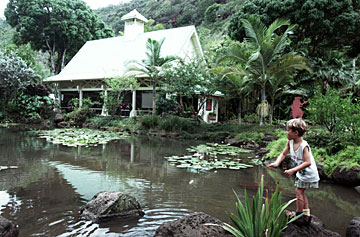
STAR-BULLETIN / MAY 1998
The Audubon Society, Army and Hawaii state agencies would pay $9 million under their part of the settlement with a New York investor.
|
|
Waimea Valley deal guarantees public access
The city's $5.1 million would help to keep the North Shore valley free of development
Easements ensuring public access while staving off future development will result from the city's $5.1 million "investment" in Waimea Valley.
"These easements are really critical because they will restrict how the land can be used, and also they will ensure that the land is used for public purposes," said Denise Antolini, a University of Hawaii law professor and one of the coordinators of the Save Waimea Coalition.
The coalition of community groups is using the long-term benefit in urging the City Council to approve the settlement reached two weeks ago to buy Waimea Valley. The City Council takes up the settlement tomorrow in the first of two meetings.
The city filed a lawsuit in 2002 to condemn the valley and put down $5.1 million toward the purchase of the land owned by New York investor Christian Wolffer.
Last month, the Council unanimously rejected an offer to settle the lawsuit, a proposal that would have allowed the back of the 1,875-acre valley to be developed.
During that meeting, Antolini and other North Shore residents urged the City Council to save the valley.
Two weeks ago, Mayor Mufi Hannemann and Wolffer's attorney, Bill McCorriston, announced that they had reached a tentative settlement that would pay Wolffer $14 million for the property.
The Office of Hawaiian Affairs, the U.S. Army through the Trust for Public Lands, the Department of Land and Natural Resources and the National Audubon Society will contribute the remaining $9 million.
As part of the settlement, OHA would take title to the land while the Audubon Society would continue to manage the 300 acres of park currently within the valley.
Antolini said that the easements are a critical component of the plan, providing another layer of protection.
"The acquisition (of the valley) in and of itself prevents it from ever sliding back in to private hands, but the easements are like extra insurance not only that it won't backslide into private development, but also that the public will get to enjoy it," Antolini said.
"That's what the coalition is all about: making sure that the long-term management and acquisition keeps it as a treasure for everyone to enjoy."

